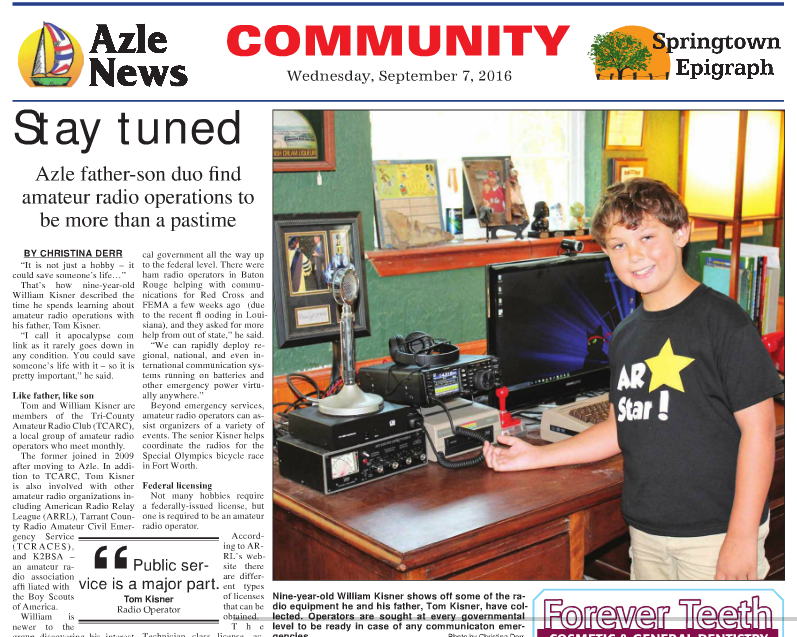Stay Tuned

Article from September 7th issue of The Azle News - http://azlenews.net/community/stay-tuned/ :
Azle father-son duo find amateur radio operations to be more than a pastime
BY CHRISTINA DERR
“It is not just a hobby – it could save someone’s life…” That’s how nine-year-old William Kisner described the time he spends learning about amateur radio operations with his father, Tom Kisner. “I call it apocalypse com link as it rarely goes down in any condition. You could save someone’s life with it – so it is pretty important,” he said.
Like father, like son
Tom and William Kisner are members of the Tri-County Amateur Radio Club (TCARC), a local group of amateur radio operators who meet monthly.
The former joined in 2009 after moving to Azle. In addition to TCARC, Tom Kisner is also involved with other amateur radio organizations including American Radio Relay League (ARRL), Tarrant County Radio Amateur Civil Emergency Service (TCRACES), and K2BSA – an amateur radio association affiliated with the Boy Scouts of America.
William is newer to the group discovering his interest in radio operations this summer.
He said that hard work, determination, and success are the qualities he most admires about amateur radio operators.
TCARC has reached out to youth for involvement in the past.
Tom said, “A few years ago, TCARC arranged for students at Walnut Creek Elementary School to be able to talk to an astronaut on the International Space Station via amateur radio as it passed overhead, and that was pretty awesome.”
Tom also initially became interested as a youth. “I have been interested in radios and technology since I was little, and I had CB radios when I was younger.
“In 2008, a weak tornado and straight-line winds uprooted trees and knocked them into our house in Hurst. It turned out that I knew one of the volunteer emergency responders that came out. He told me about amateur radio operators monitoring the storm and helping the fire department. He helped me get a license and become involved shortly after that.”
No limits
There is a sense of limitlessness that appeals to many operators as Tom explained: “I have made radio contacts with all 50 states, and now I am seeing how many countries I can contact – I am up to about 20.
“I have learned so much. I am constantly learning and trying new things on radio. It is impossible to run out.” Tom said there are practical purposes for learning radio operations, “Public service is a major part. It is everyone’s emergency communication plan from local government all the way up to the federal level. There were ham radio operators in Baton Rouge helping with communications for Red Cross and FEMA a few weeks ago (due to the recent flooding in Louisiana), and they asked for more help from out of state,” he said. “We can rapidly deploy regional, national, and even international communication systems running on batteries and other emergency power virtually anywhere.” Beyond emergency services, amateur radio operators can assist organizers of a variety of events. The senior Kisner helps coordinate the radios for the Special Olympics bicycle race in Fort Worth.
Federal licensing
Not many hobbies require a federally-issued license, but one is required to be an amateur radio operator.
According to ARRL’s website there are different types of licenses that can be obtained.
The Technician class license, according to ARRL, is most commonly chosen by entry-level ham radio operators. It can be obtained after passing a written licensing exam.
Holders of this license are limited to communicating on frequencies above 30 megahertz and throughout most of North America.
Other licenses include the General class license and the Amateur Extra class license.
William took the 35-question Technician class exam and fell only one question short of passing – he hopes to retake it soon.
Tom said licensed amateur radio operators are not only licensed to communicate with each other.
This federal license allows them to build and experiment with their own equipment – and that can lead to numerous technological discoveries.
“Many of the technical innovations we take for granted today – cell phones, personal computers, GPS tracking, and wireless internet – were directly invented by ham radio operators and/or experimented with on ham radio first, often years before the general public sees them. I have gotten to meet some incredibly smart engineers through amateur radio.” While amateur radio operation has many practical applications, allowing for communication with other operators around the world and the discovery of new technology, those are not the only reasons bringing the Kisners back for more. Tom said, “It is fun. There are a lot of different contests. People like to restore WWII-era radios and other people like to experiment with the latest software-defined radio.
“Some like to contact other countries, others like to relay signals through satellites, and some people even bounce radio signals off the moon to Europe. Some people just enjoy chatting with friends across Azle.”
How to get involved
For more information on local ham radio operations and TCRAC go to http://wc5c.org.
The group meets the first Saturday of each month. Due to the Labor Day holiday Sept.’s meeting will be held Saturday, Sept. 10 at 7:00 p.m. at El Torito restaurant in Azle.
The group also broadcasts every Thursday at 8:00 p.m. on 147.160 (CTCSS 110.9) and all licensed operators are welcome to join.
